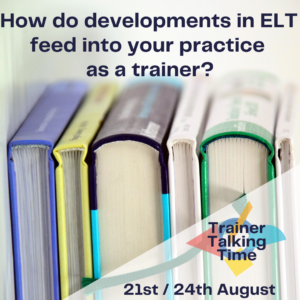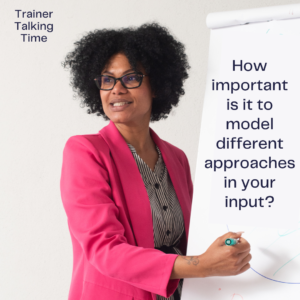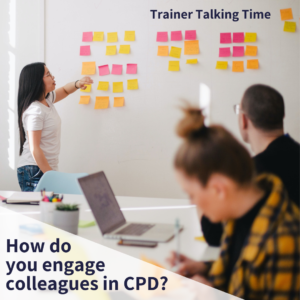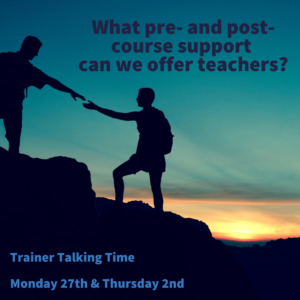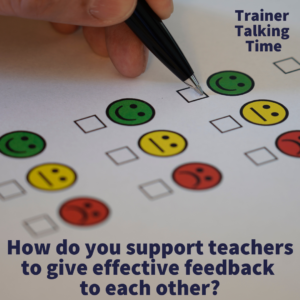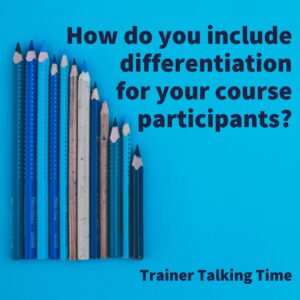Huge thanks to everyone who was able to attend one of the Trainer Talking Time sessions and as always, apologies for the note-taking and subsequent waffle below – it’s so difficult to write good notes when the conversation is so engaging!
How do you find out about developments in ELT?
Google Scholar – and one trainer mentioned how having a PhD helps you to develop the skills to skim/scan academic articles to find what you need. We also highlighted how theory and ‘behind the scenes’ information is more useful than the quick tips and listicles whcih come up more frequently in regular searches.
Being a part of Communities of Practice (CoPs) which are more researchers than teachers. Calls for papers tend to be more forward-looking, which could be quite overwhelming for teachers, but these are developments which will be coming in five years’ time.
BAAL (British Association for Applied Linguistics) has a research SIG (Special Interest Group).
One trainer suggested asking questions on social media, people will tend to share links.
Edutopia – a fantastic resource, you can sign up for a newsletter in an area that interests you, it has practical activities to put research into practice with different levels of teacher experience.
Facebook offers a lot in terms of professional development, but there is a lot of information overload and competing ideas. People suggested the following Facebook groups:
An exam-focused trainer said she follows exam boards and publishing houses who do exams. She mentioned that TOEFL format changed in July so there is a lot of information about that in North American forums.
Another trainer is taking the NILE Trainer Development course and said a lot of what she’s reading is ‘good old-fashioned psychology, human nature stuff that hasn’t really changed’. If you’re thinking about the course, Rachel Tsateri has a great series of blogposts covering her experience.
What makes an expert teacher? Trainers mentioned being interested in motivation and how to integrate socio-cultural dimension into their own practice – rather than looking at language skills. Similarly, moving away from a blinkered ELT/language focus, other people are looking at teaching in general, rather than a specific focus on ELT, e.g. John Hattie. However, people who are interested in SLA/ALA, might argue that we do need that more focused input.
What opportunities do you have to discuss these developments with other trainers?
‘Feel a bit lonely sometimes’ – as a teacher you often have a staffroom and there are more opportunities to learn things online.
Building rapport with the teachers when you’re working online with teachers – how do you get teachers on-board with this idea?
Training can be quite lonely, there’s a lot of trial and error and we often learn on the job. Many of us could benefit from support in developing our training skills.
As a more experienced trainer, companies perhaps feel you don’t need that support.
How do these developments feed into your practice?
The gap between researchers and teachers is still very wide – they’re not listening to each other and the language of research can be quite elitist.
New ‘buzzwords’ are being invented in academia all the time. Teachers learn something, then are told that’s no longer relevant, but they know what works in their lessons.
Working with pre-service teachers, there’s a danger of overwhelming them with advanced information. They need the basics. This can also affect your motivation as a trainer to look into new developments if you can’t put them into practice.
Trying to cherrypick what is relevant for your teachers – how relevant is it to their classes? Knowing what focus your teachers need – what is necessary for them at that time? Some skills/knowledge are needed straight away and practicioners need experience and success with those things to feel motivated (e.g. a tip that transforms classroom management overnight inspires them and motivate them and then encourages them to look into other things).
How confident you feel as a trainer also has an effect on what areas you look into. There might be a significant bias that you have as a trainer, e.g. you might want to ignore AI and what it means for us as ELT professionals.
Time is an issue as well – we don’t have time to do the research for it to then feed into our practice.
